The Amateur Mycologist - Series II
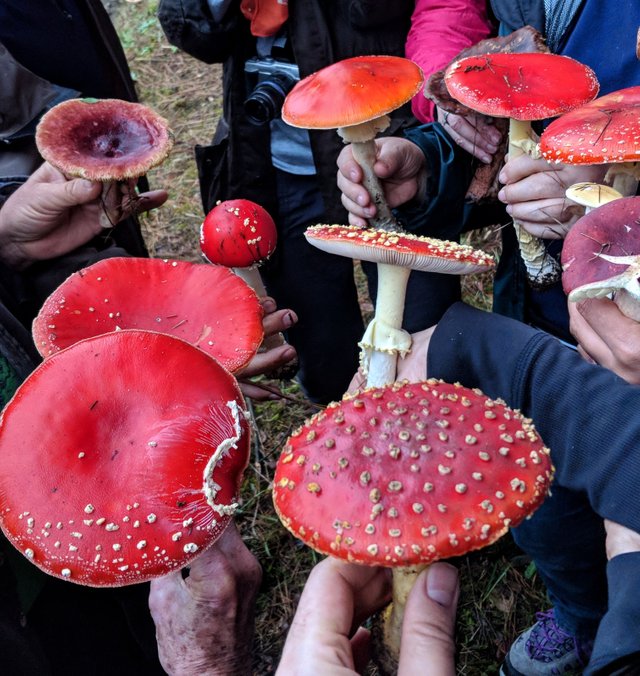
When a quadrillion gorgeous Amanita muscarias are the tip of the fungal iceberg, you know you've had a great foray.
Hello Steemit!
It's been awhile, over two months, since my last mycology post. I've been hella busy in the interim, both at my actual, IRL job, as well as working on my flash fiction/short story subreddit r/LFTM.
But the last two weeks has been absolutely tremendous for me as I had the extreme pleasure of journeying around southern Chile in the company of some of the preeminent mycologists and Fungi enthusiasts in the world.
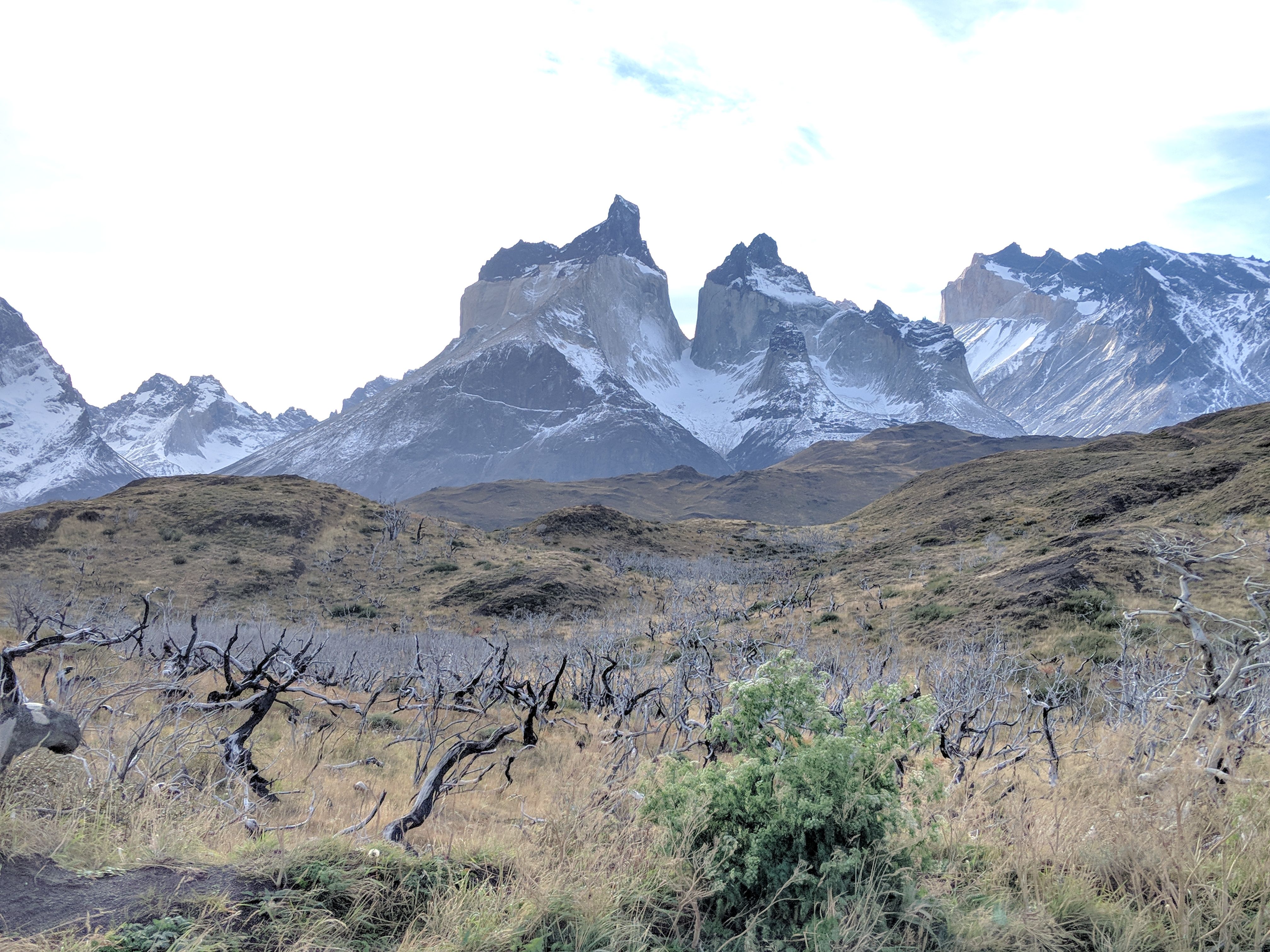
The foray was led by Giuliana Furci of the Fungi Foundation, a Chilean non-profit founded and run by Giuliana.
The Fungi Foundation is an incredible organization. Whether furthering public education or achieving legislative and regulatory change in Chile and around the world, Giuliana and the Foundation are working tirelessly on behalf of the unique and often overlooked Kingdom of Fungi.
During the course of this trip I had the immense pleasure of getting to know Giuliana, as well as my other incredibly knowledgeable and generous travel companions. I was able to work hands on collecting and cataloguing over 150 fungal specimens to add to The Fungi Foundations fungorium, a collection of, now, over 800 dried specimens, some of them unique or exceedingly rare in the field of mycology.
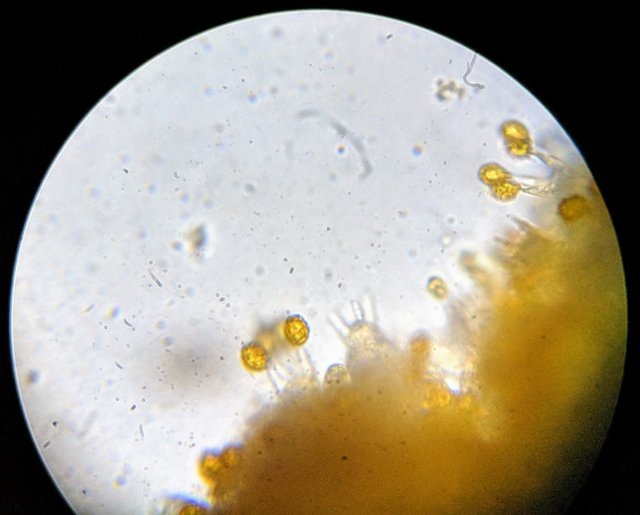
Sometimes working late into the night, capturing images like these Ramaria spores, I was able to learn a ton, about microscopy and starting a rigorous Fungi collection.
I finally got some experience using a 100x oil immersion lens, and got much needed guidance about mount preparation and staining. I learned much more about depth of field issues and how to identify microscopic fungal structures more accurately. I saw the surface structures of a fungal spore for the first time for goodness sake!
Part of my learning experience was also finding out everything I didn't know and what resources I could use to rectify my ignorance. With that in mind I have several books en route which should help solidify my intellectual gains, and I'm currently vetting several possible microscope upgrades that should allow me to do much finer microscopic work.
In addition to learning a great deal about how to be a better amatuer mycologist, I also had the pleasure of seeing some of the most beautiful mushrooms in the world, with some of the nicest people I've ever met.
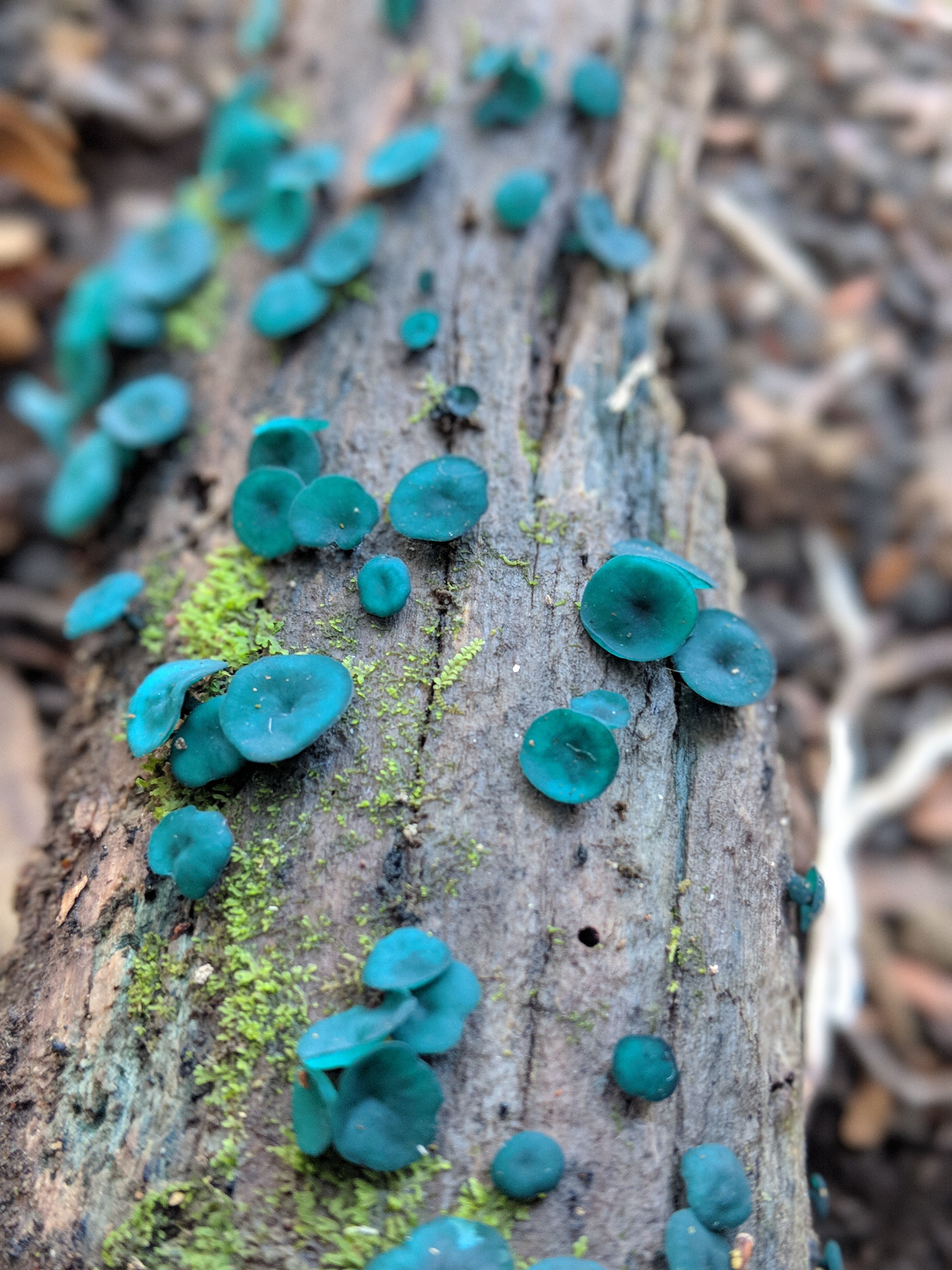
Mushrooms the likes of which I could never have dreamt of seeing in person, like these Chlorociboria.
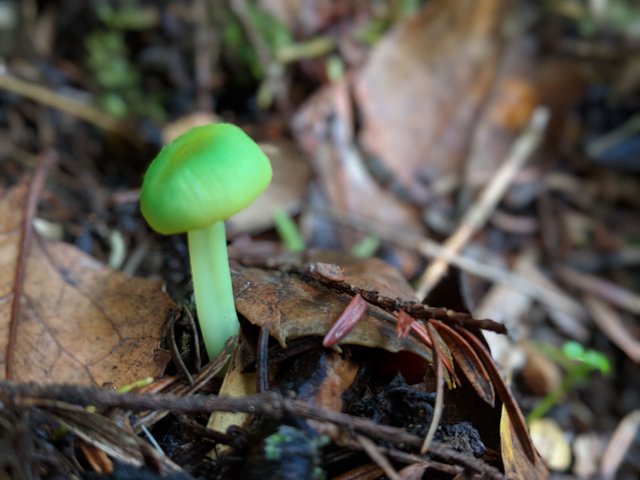
Gorgeous and implausible beauties like this bright green Entoloma, all of which I did my absolute best to capture in as much detail as possible.
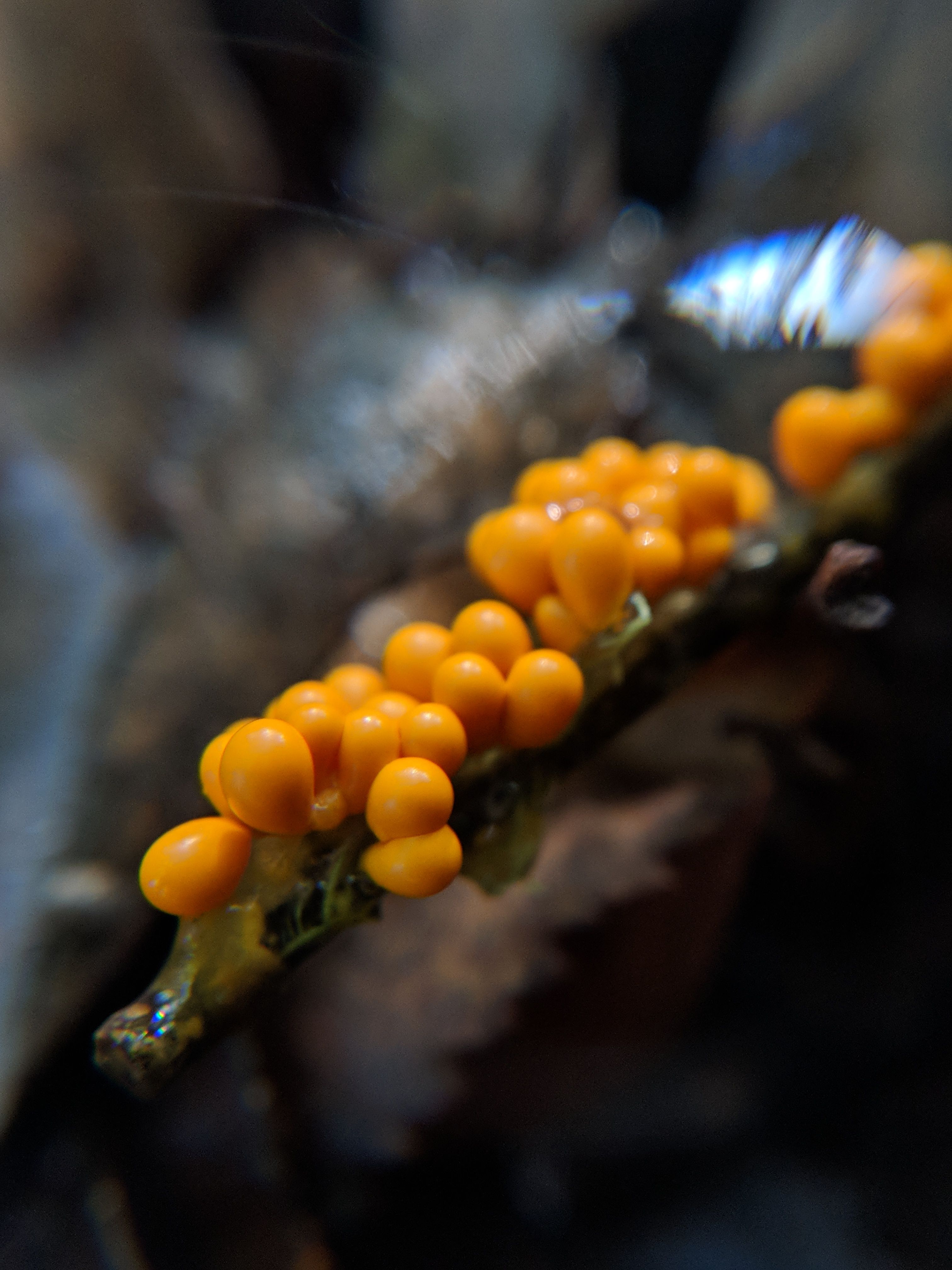
Whether myxomycete, like this lilely Leocarpus species, or fungus, the organisms we encountered on this trip were absolutely breathtaking.
Over the next weeks and months I will be writing about the amazing life I had the pleasure witnessing and documenting alongside my fellow travellers. At the same time I will be documenting what I hope will be the building of a personal fungorium of local species growing on the streets and parks of New York City.
The result, I hope, will be a resurgence of mycology content in greater depth and detail, covering species of greater complexity and general awesomeness, than I was capable of providing before.
All of this was made possible by the Steemit and the awesome people behind @steemstem

Thank you so much for your support.
On the one hand, @steemstem's consistent support of my content directly financially supported both this trip and my upgraded equipment.
However, it was @steemstem's devotion to scientific rigor and care that pushed me to consistently increase the quality and thoroughness of my posts. My entire identifying process - which I was gratified to discover on this trip was not entirely off base - developed as a direct result of trying to meet the high standards set by @steemstem, @lemouth and @justtryme90.
Without that base of knowledge, let alone the financial support, I would never have gone to Chile (or seen CERN and the CMS for that matter). This has been a banner year for me, and Steemit and @steemstem have made it all possible.
I am super excited to be back with so much to share. I'm not sure what schedule I'll keep exactly as I try to balance work with Steemit and reddit, but if everything goes according to plan I should be able to provide new and awesome mycological content in the coming months.
Thank you all!
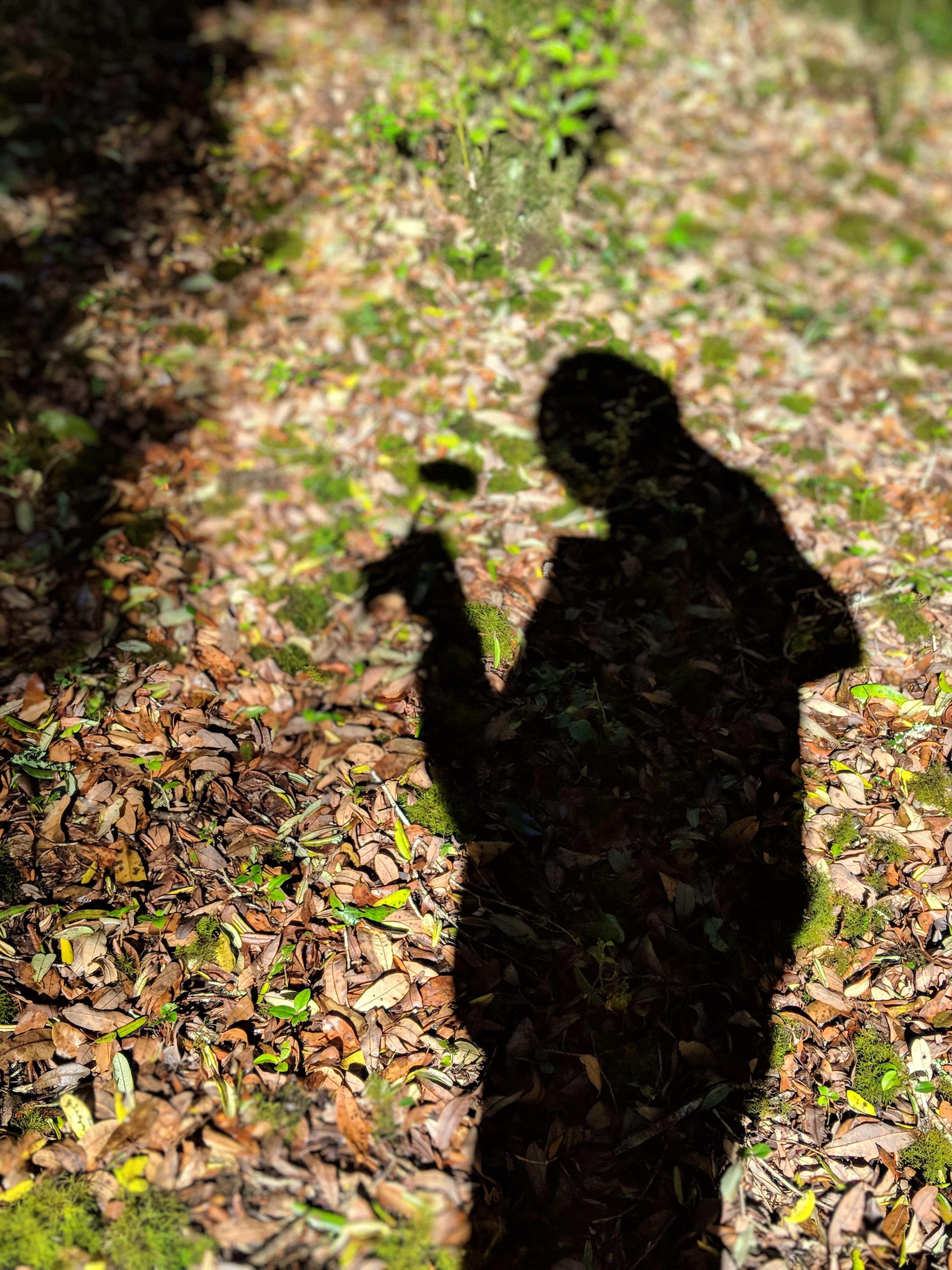
Photos are my own
This is the best of the day I have read so far. I am so happy that you are back among us. I am so happy that I don't know from where to start. Maybe to say that I am looking forward to read more about your trip to Chile. Are those mushrooms (fungi, I know ;) ) really so colorful?!
And in the meantime, welcome back!!! :)
Thanks @lemouth, great to be back!
All of the species pictured here are fungi, except for the glossy yellow blobs, which are the fresh fruiting bodies, or sporangia, of a plasmodial slime mold or myxomycete, likely in the genus Leocarpus.
And all of these photos have been almost entirely unretouched - meaning all of the mushrooms pictured here really were just as vibrantly colored as they appear in these photos, if not more so in person. The sheer diversity was astounding to me.
The funny thing is that our host would often take the greatest interest in a seemingly benign and uninteresting species that, although unremarkable to me visually in some cases, were nonetheless extraordinarily rare in Chile.
So we would all be freaking out over many of the most colorful species while Giuliana would be more interested in some plain looking brown Hydnoid toothed fungus that I felt like I saw all the time in NYC but which was all but unheard of in Chile.
Your message somehow shares the local atmosphere. I cannot even imagine how this was when you were there in person :)
Why would you expect to see the same species in NYC and Chile? Different regions yield different species, don't they? :)
Sometimes, but not exsclusively. The slime molds for instance are famously cosmopolitan, appearing all over the world. The Amanita muscarias occur over much of the world, including New York. A variety of the mushrooms we foubd have macrocharacteristically similar or identical Northern or Eastern species, and no doubt some are genetically the same as well.
The cmbination of spores traveling great distances naturally with species introduction through human travel and direct interference means finding similar gobal species is not uncommon.
Oh? Is this a general statement? I could imagine the species having a common ground but then local peculiarities. No?
Oh totally - they are constantly reproducing with each other, and as genetic testing becomes more common place many mushrooms previously thought to be the same species have been revealed to technically be a series of genetically distinct but closely related species instead.
Plus, even if the species are genetically identical, there can be a ton of differences in the chemistry of the mushroom itself dependent on where it grows. For instance, G.esculenta contains deadly toxins when it grows in some environments and yet appears not to contain those same chemicals when grown in other environments.
Even the A.muscarias - the red, white dotted mushrooms at the top of this post - are alleged to have very different effects on people who ingest it depending on where they are grown - with anecdotal stories of North American A.muscaria potentially having a very different mycotoxin than the same species grown in Siberia. I don't think anyone much cares to test this at the moment, but it's entirely plausible that comparing A.muscaria from Siberia and North and South America might show three genetically distinguishable mushrooms, or, three genetically identical mushrooms with very different mycotoxin profiles.
There's lots of examples of this sort of thing that I might be able to wrangle into a post on its own - but as a general statement, yes: between the ability of the spores to travel great distances and direct human interference in ecosystems, you can find a great many identical or near identical fungal species all over the world.
Thanks a lot for the explanations. I agree you should write full posts on that (in due time of course) in the future. This is very interesting, even for a physicist like me ;)
Finding an Amanita like the first ones pictures is on my bucket list! I feel like finding one will be a rite of passage, just like when I found my first morel. I wish I could go on trips like that studying fungi. I am happy with what I saw on your page and I'm giving you a much deserved follow!
We passed through a conifer forest between parks and found it absolutely overrun with Amanitas - just an endless supply of muscaria and rubescens, as well as the some of the Chilean A.toxica. Plus these giant Russulas that were just everywhere. I've never seen anything like it.
Are you a member of your local mycology club or group? There almost always is one and its a good palce to start getting to new areas. This whole thing was the result of cinnecting with the NYMS on facebook and steemit.
I'm not a part of any local club but I have thought on it heavily
I hesistated to get involved for the longest time and Chile really changed things for me. It's really nice to share this with folks in person and you learn a ton that way to boot.
I just checked it's $20 for a year membership in the Illinois Mycological Association! That's cheap! I think I'm going to do it!
Wow! The pictures are colourful with great details. Thanks for sharing your experience with us.
Lots more where that came from - some really amazing fungi photos coming.
The Journey has started....... Hey Bud!!!!
It has!
Welcome back @dber, I really look forward to you sharing all your new found knowledge, what an awesome experience you have had. Those Chlorociboria are stunning, I am excited to learn more. xx
Thanks @trucklife-family! It's nice to be back and with a lot of new content to share. The Chlorociboria are just the tip of the iceberg, although I'll probably do a species post in more detail.
Good hearing from you! That sounds like an awesome trip!
A high water mark or me travel wise for sure.
Very interesting and colourful these many
mushrooms! We have those big red Amanita
muscarias up here in Alaska. I've never seen
a bright green Entoloma! Wow!
Great to see your post this morning in my feed!
Thank you for this wonderful information and
awesome photos!
Resteeming for other mushroom folks to see 🍄
Thanks @shasta. I was interested to see a green Entoloma apparently grows in the North American Great Plains, although I would guess these two species are not the same...
Ahh he's back. That one fungus looks like its photosynthesizing.
Hey @derz!
It does look sneakily photosynthetic huh? I don't think that's what's happening, but I haven't looked into it carefully enough yet.
How you been?
Not as adventurous as you, but nowadays, thanks to you, I do try and see if any fungi are growing on any tree I pass.
you are welcome back @dber. You seemed to have gotten a good grip of your new toy with these awesome pics. Unbelievable species of mushrooms. I will patiently wait as you slowly release knowledge from your ammunition. :)
Haha - I will probably do general photos tours for specific parks and then do species posts on the most impressive, well documented species I have photos of.
Fascinating stuff I sure mushrooms hold the key to many cures 💯🐒